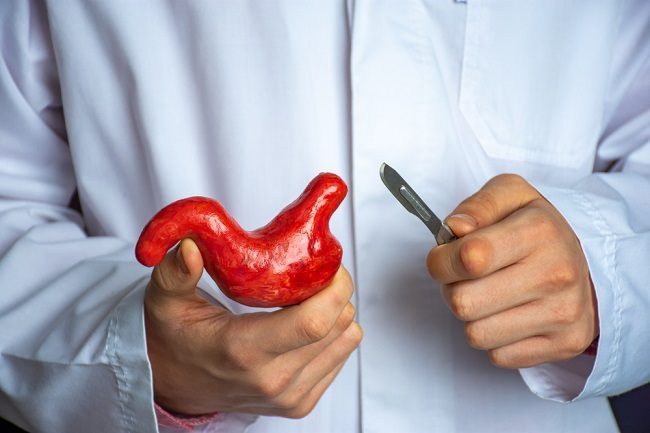Do not underestimate coughing up blood or hemoptysis. This condition can be a symptom of a serious, life-threatening illness.
Blood that comes out when coughing is generally mixed with phlegm. Coughing up blood in young people may not be a sign of serious illness and can be treated immediately. However, this condition can be a dangerous indicator, especially for those who are old and smokers.

Causes of coughing up blood from mild to severe
The presence of blood in phlegm when coughing can generally be caused by a severe cough for a long time. However, there are many other conditions that can cause coughing up blood, including:
- Bronchitis: respiratory tract disorders in the long term that causes a buildup of phlegm. Bronchitis can be triggered by many causes, such as a previous lung infection and inhaling pollutants.
- Tuberculosis (TB): a severe lung infection with general symptoms of fever, sweating, cough with colored or pus-filled phlegm, and tightness in the chest. Coughing up blood will subside as soon as the infection is cured.
- Pulmonary embolism: blood clots in the blood vessels in the lungs that can cause shortness of breath and sudden chest pain.
- Pulmonary edema: accumulation of fluid around the lungs with symptoms of phlegm that is issued when coughing is pink and foamy. This condition generally occurs in people who first experienced heart disease.
- Lung cancer: this situation is more common in smokers over the age of 40.
- Cancer of the throat.
- Cystic fibrosis: a genetic condition that causes disorders of the lungs and digestive system.
- Side effects of drugs, such as cocaine and blood-thinning drugs.
- Emphysema: disorders of the air sacs in the lungs.
- Abscess or purulent wound in the lung.
- Pneumonia or wet lungs.
- Parasitic infection.
- Objects that are inhaled or enter the nose can also cause injury to the respiratory tract and cause coughing up blood. The object can be a toy, a bean, a bead, or anything that can get into the nose.
- Inflammation and abnormal tissue buildup can affect the respiratory tract and cause coughing up blood. Conditions that can cause this situation include Goodpasture's syndrome, Wegener's granulomatosis, lupus pneumonitis.
In very rare cases, coughing up blood can be a symptom of:
- A heart valve disorder called mitral stenosis.
- Indication of a serious vascular disease called polyarteritis nodosa.
However, there are times when coughing up blood cannot be categorized as hemoptysis if it is caused by the following conditions:
- Pseudohemotysis: bleeding from the mouth, nose or throat can cause blood to come out along with drooling. This case is different from the blood coming out of your lungs. Blood coming from the lungs is often mixed with phlegm
- Hematemesis: the direction can also be out of the digestive tract in the form of vomiting. This can be a symptom of another disease, such as inflammation of the stomach lining.
Patients with coughing up blood need further treatment as soon as possible. There are some specific conditions related to this. You need to be treated by a doctor if you cough up more than a teaspoon of blood when you cough. Apart from coughing, there is blood in the urine and stool. Pay attention to the condition of your cough if it is accompanied by other symptoms, such as dizziness, chest pain, fever, shortness of breath. Don't ignore your condition if you lose your appetite and experience weight loss because both conditions can be important indications. Finally, coughing up phlegm mixed with blood that lasts more than a week.
Hemoptysis Test
To determine the right treatment, the doctor or hospital will apply several tests to determine the level of bleeding, its cause, and its impact on breathing. These tests may include:
- History and physical examination. The doctor will take a sputum sample to check for possible infection.
- General practitioners can refer patients to specialist doctors or hospitals for examination with X-ray or CT scan.X-ray will detect the presence or absence of fluid and blockage in the lungs. While with CT scan a more detailed picture of the structure of the lungs will be obtained.
- Bronchoscopy. This is done by inserting an endoscope or a small tube with a camera on the end into the respiratory tract through the mouth or nose.
- blood count/ccomplete blood count (CBC). That is a blood test to count the levels of red and white blood cells in the blood, as well as cells that have an impact on blood clotting.
- Urinalysis to detect abnormalities in the urine.
Several kinds of blood tests can be done to test for hemoptysis. The blood will be taken to a laboratory to obtain a blood chemistry profile to detect possible electrolyte imbalances and disorders of kidney function. There are also tests to detect levels of oxygen and carbon dioxide in the blood because oxygen levels in people who have coughing up blood are usually low.
Relieves Coughing Blood
Treatment for coughing up blood is aimed at stopping the symptoms as well as treating the cause behind the condition, such as doing chemotherapy for lung cancer. In addition, steroids for inflammation can be given or antibiotics for the treatment of pneumonia or tuberculosis.
Don't let the cough problem get worse and don't go away for a long time. With the use of appropriate and safe cough medicine, generally coughing up blood can be prevented, even if coughing up blood has occurred, it must be treated immediately to stop the symptoms and at the same time deal with the causes behind the onset of the condition.
There are times when the cause of coughing up blood cannot be identified specifically. This condition is called idiopathic hemoptysis. However, this condition should continue to be consulted if it persists so that it can be treated immediately if it turns out to be a symptom of a life-threatening disease.









